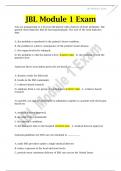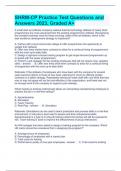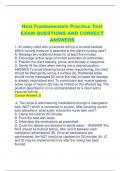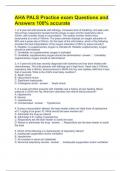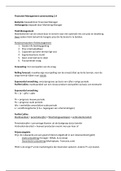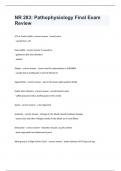Severe Mental Illness – Prerecorded online lecture notes
WEEK 3
Online lecture - The recovery paradigm
- saying to a patient “we’ll see you back” kills hope and shows you don’t believe in
their recovery
- hope is not evidence-based but it is central to personal recovery
- hope is rarely communicated by mental health professionals
- not talking about hope in words, but also by not focusing on rehabilitation, building
up a meaningful life
- we need to deal with positive outcome bias bc people can recover especially if
they only experience 1 episode
- scientific bias those who recover are not included in scientific research, only those
who suffer again and again
- myth 1 symptom reduction is not possible; once a SCZ always a SCZ
o wrong, it is possible, there’s heterogeneity in outcome, this is again because
those who are in clinics and research are not the ones who have recovered,
they get overlooked
- myth 2 SCZ is considered a homogenous category
o wrong, there’s actually a lot of diagnostic diversity, not everyone with
hallucinations also develop a full blown SCZ disorder
- myth 3 when someone has SCZ symptoms, they will be on life-long medication
o wrong, evidence shows that 25-50% can actually get off meds in the long run
- to recover, you don’t necessarily need to get rid of all symptoms
- people can still have a meaningful life, voices can become adaptive and helpful
- myth 4 don’t bother with psychotherapy, only address SCZ by putting patients on
medication, and get rid of positive symptom as soon as possible
o it doesn’t always work, even if it would work to reduce hallucinations, people
still have to make sense of their experience and identity and psychotherapy
helps with that
o psychotherapy to integrate experiences might not fit with the cure paradigm
but helps with leading a meaningful life
- myth 5 people with SCZ background can only do low level jobs, if they can work at
all
o wrong, people who don’t fall back into other episodes are not impaired to not
be able to go to work, this is prejudice and stigma, it’s the stigma that
prevents people from going in the job market rather than their capabilities
- myth 6 families are to blame for the member who gets diagnosed with SCZ, both
on genetic and psychological levels
o regardless of whether they had a role in the development, they are the most
network around the patient and know the patient the most, they are
collaborators during recovery, including family in treatment is a good idea
o if not included, patients can feel estranged from their families, a divide
between before and after hospitalization
- recovery is not just about symptoms, it’s about the relationship with symptoms and
the way me make sense of the symptoms
, Founding father of the recovery paradigm, Anthony
- when people get diagnosed with a SMI, there are 4 domains affected by it:
o impairment (all signs of abnormality, loss of certain functions, presence of
pos. symptoms)
o dysfunction limitations that prevent people from fulfilling tasks/activities
that are required in social situations, for societal purposes e.g. paying taxes at
the municipality
o disability lack of ability to perform societal roles e.g. being in employment,
renting a house (unwritten rules about how to behave as a renter)
o disadvantage to be disadvantaged in the opportunities to find a
meaningful place in society without stigma, discrimination or poverty
- default psychiatric focus is only on impairment category
o this discourse is avoidance motivation the motivation to prevent
symptoms from happening
o the other 3 D’s get ignored if you want to address the all domains we
need an approach motivation build up skills and maintain them for a
meaningful life
o in line with positive psychology emphasis on building something rather
than preventing
Medical model terminology
- 1. state of illness complaints people experience that they come into the doctor
with
- 2. disease we assume that these states are caused by an underlying disease
(ontological idea)
- 3. symptoms observable effects or manifestation of the disease
o not the same as state of illness, symptoms are not always what people
experience as the most functionally disturbing thing for them
o unfortunately, in the medical model, caretakers might give more attention to
symptoms than state of illness, understandable from this view bc the goal is
cure and eliminating symptoms
WEEK 3
Online lecture - The recovery paradigm
- saying to a patient “we’ll see you back” kills hope and shows you don’t believe in
their recovery
- hope is not evidence-based but it is central to personal recovery
- hope is rarely communicated by mental health professionals
- not talking about hope in words, but also by not focusing on rehabilitation, building
up a meaningful life
- we need to deal with positive outcome bias bc people can recover especially if
they only experience 1 episode
- scientific bias those who recover are not included in scientific research, only those
who suffer again and again
- myth 1 symptom reduction is not possible; once a SCZ always a SCZ
o wrong, it is possible, there’s heterogeneity in outcome, this is again because
those who are in clinics and research are not the ones who have recovered,
they get overlooked
- myth 2 SCZ is considered a homogenous category
o wrong, there’s actually a lot of diagnostic diversity, not everyone with
hallucinations also develop a full blown SCZ disorder
- myth 3 when someone has SCZ symptoms, they will be on life-long medication
o wrong, evidence shows that 25-50% can actually get off meds in the long run
- to recover, you don’t necessarily need to get rid of all symptoms
- people can still have a meaningful life, voices can become adaptive and helpful
- myth 4 don’t bother with psychotherapy, only address SCZ by putting patients on
medication, and get rid of positive symptom as soon as possible
o it doesn’t always work, even if it would work to reduce hallucinations, people
still have to make sense of their experience and identity and psychotherapy
helps with that
o psychotherapy to integrate experiences might not fit with the cure paradigm
but helps with leading a meaningful life
- myth 5 people with SCZ background can only do low level jobs, if they can work at
all
o wrong, people who don’t fall back into other episodes are not impaired to not
be able to go to work, this is prejudice and stigma, it’s the stigma that
prevents people from going in the job market rather than their capabilities
- myth 6 families are to blame for the member who gets diagnosed with SCZ, both
on genetic and psychological levels
o regardless of whether they had a role in the development, they are the most
network around the patient and know the patient the most, they are
collaborators during recovery, including family in treatment is a good idea
o if not included, patients can feel estranged from their families, a divide
between before and after hospitalization
- recovery is not just about symptoms, it’s about the relationship with symptoms and
the way me make sense of the symptoms
, Founding father of the recovery paradigm, Anthony
- when people get diagnosed with a SMI, there are 4 domains affected by it:
o impairment (all signs of abnormality, loss of certain functions, presence of
pos. symptoms)
o dysfunction limitations that prevent people from fulfilling tasks/activities
that are required in social situations, for societal purposes e.g. paying taxes at
the municipality
o disability lack of ability to perform societal roles e.g. being in employment,
renting a house (unwritten rules about how to behave as a renter)
o disadvantage to be disadvantaged in the opportunities to find a
meaningful place in society without stigma, discrimination or poverty
- default psychiatric focus is only on impairment category
o this discourse is avoidance motivation the motivation to prevent
symptoms from happening
o the other 3 D’s get ignored if you want to address the all domains we
need an approach motivation build up skills and maintain them for a
meaningful life
o in line with positive psychology emphasis on building something rather
than preventing
Medical model terminology
- 1. state of illness complaints people experience that they come into the doctor
with
- 2. disease we assume that these states are caused by an underlying disease
(ontological idea)
- 3. symptoms observable effects or manifestation of the disease
o not the same as state of illness, symptoms are not always what people
experience as the most functionally disturbing thing for them
o unfortunately, in the medical model, caretakers might give more attention to
symptoms than state of illness, understandable from this view bc the goal is
cure and eliminating symptoms



